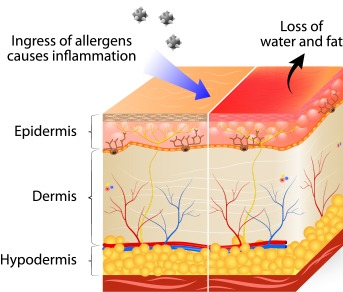Sensitive Skin
Although there are many different types of skin conditions, Sensitive Skin is one of the most common skin complaints. Whilst sensitive skin is not classed as a medical condition itself, it can cause a variety of issues for the sufferer both physically and mentally.
What is Sensitive Skin?
If you’ve ever experienced slight redness on your skin that is itchy or feels tight, you’ve most likely experienced some skin sensitivity. Although it may seem random, there is a valid biological reason as to why this occurs in certain individuals and not others.
The outer layer of our skin acts like a barrier to keep harmful properties out of the skin, however in order for this barrier to work properly it must contain a certain amount of moisture. As our skin is exposed to many different things in the environment, this barrier can weaken with air conditioning, cold weather and harsh chemicals being some of the most common culprits.
Your skin’s PH level is also an important factor when understanding sensitive skin. The outer layer of the skin has a more acidic PH level (5.5). Detrimental factors to this layer, as mentioned above, will cause the PH level in the skin to drop, thus becoming sensitive due to the weakened barrier.
Causes of Sensitive Skin

Causes of Sensitive Skin
There are 7 common causes of sensitive skin:
Outside Environment – Changes in the weather can be very detrimental to your skin’s health, with both cold weather and the sun having a negative effect, resulting in conditions such as sensitive skin and dry skin. You can see straightaway a negative effect on the skin when your lips become dry, cracked and sore in cold weather. In hot weather the sun’s harmful rays can penetrate through the outer skin barrier, which harms the layers underneath leading to sensitivity and eventually sunburn.
Inside Environment – You may think your skin is safer when you’re inside, however appliances such as air conditioning and central heating can cause the skin to become dehydrated, which can result in sensitive skin. If possible it is best to avoid these situations where you would be subjected to these harmful appliances. Alternatively try not to flick between an air conditioned room to a non-air conditioned room as the difference in the atmosphere can cause sensitivity of the skin, due to the body not being able to adjust to it in enough time.
Harsh Chemicals/Irritants – Unfortunately in the market today there are products that contain harmful ingredients that can cause sensitive skin and other skin conditions. Best advice is to always look at the ingredients before buying something, especially if it is to be applied to the skin. This is the same for laundry detergent as if you wash your clothes with a product that contains possible harmful properties, it will stay on the clothes and affect you as you wear them.
Hormones – Sensitive skin due to hormones is the only cause that happens internally. Typically women suffer more from sensitive skin than men, this is due to the menstrual cycle. When a woman goes through her period her hormones fluctuate, and fluctuating hormonal activity can cause sensitive skin, as well as acne. It is also common to see these symptoms in pregnant women and teenagers because of fluctuating hormones.
Hard Water – There are areas throughout the UK that have a water supply containing high levels of minerals including iron, magnesium and calcium, which are highly alkaline. You can notice hard water by looking closer at your tap, kettle, washing machine (any appliance that uses the water supply), and you can see lime scale, which is a result of the hard water. Now if lime scale is damaging to robust appliances, it is more damaging to your skin.
Cleansers – Excessive cleansing and using the wrong cleanser for your skin are the most common faux pas in a beauty regime. If you cleanse too often your skin doesn’t have time to replenish the natural oils in the skin, resulting in it becoming dry and sensitive. If you cleanse with the wrong kind of cleanser, i.e. you have dry skin and use a cleanser designed for oily skin, this will cause skin sensitivity and other conditions. However choosing the right cleanser for your skin type will have a positive outcome for it will help your skin function properly.
Bad Lifestyle – Your whole body needs to be looked after in order to maintain healthy skin. So if you have a lifestyle that consists of late nights, little to no sleep, smoking, drinking excessively and more this will impact your skin negatively. It is common to find swimmers suffering from dry and sensitive skin due to the chlorine in the pools, as it is a harsh chemical to the body. If you’re a frequent flier also you may find your skin is less healthy than an infrequent flier due to the air filtration on the aircraft, which dries out the skin for the entire length of the flight. It is best to try and combat these lifestyle choices by either removing them from your life or using an appropriate cleanser straight after the lifestyle choice has occurred.
Treatment for Sensitive Skin

Treatment for Sensitive Skin
With sensitive skin, cures are not as straightforward as other skin conditions like acne. Individuals can either use a medical product to relieve the sensitivity or amend their lifestyle.
The following treatments and remedies are most common to help relieve or prevent sensitive skin:
Moisturisers and Creams – This is the most common and most effective immediate treatment for sensitive skin. Obagi Nu-Derm Systems are top of the line when dealing with skin sensitivity and premature aging, the product contains Zeatin, which helps improve roughness of the skin. It also contains Kinetin, which helps the skin retain moisture alleviating sensitivity.
Sunscreen – As the sun is one of the main causes for skin sensitivity it is important to use an effective sunscreen all year round to protect your skin from burns. If possible use a sunscreen that has an SPF of 30 or 50 to help block out harmful UV rays. Obagi Sun Shield and Obagi Sun Protection are products that have been proven to be very effective for those with sensitive skin that need a higher level of protection.
Lemon Water – More of a herbal remedy, a glass of lemon water drunk once a day. This can help combat free-radical damage, purge toxins and keeps your skin hydrated, resulting in the skin looking more radiant whilst preventing acne, blemishes and reducing sensitivity.
How Can We Help?
Healthxchange is a trusted supplier of pharmacy products to healthcare professionals and offer a range of treatments that can be used to help prevent and manage sensitive skin.
Obagi Nu-Derm Systems are formulated specifically for people with sensitive skin and/or premature aging. If coupled with other Obagi products, such as Obagi Hydrate, it can not only help prevent future sensitivity but also keep the skin looking radiant and blemish free.
To find a clinic near you offering Obagi Nu-Derm Systems or Obagi Hydrate products, visit our Clinic Finder here.